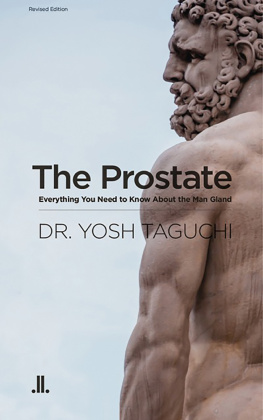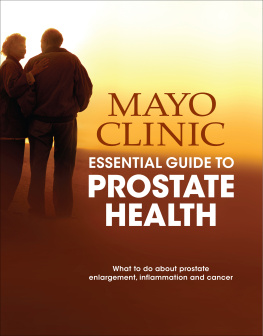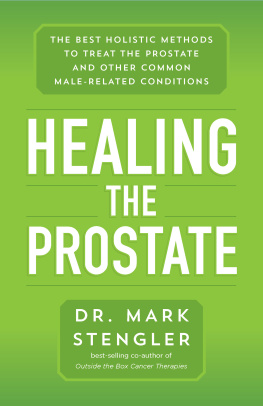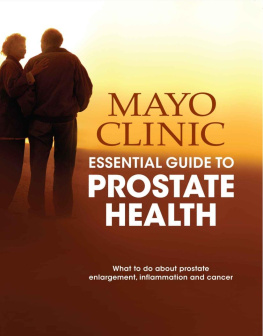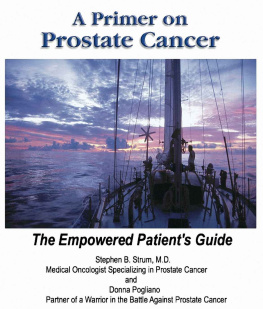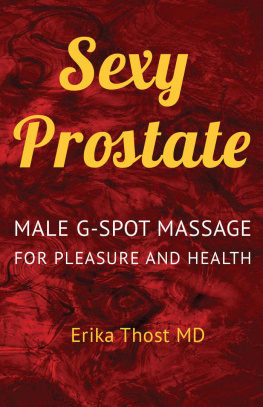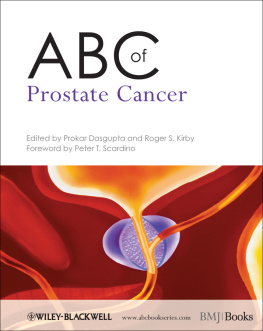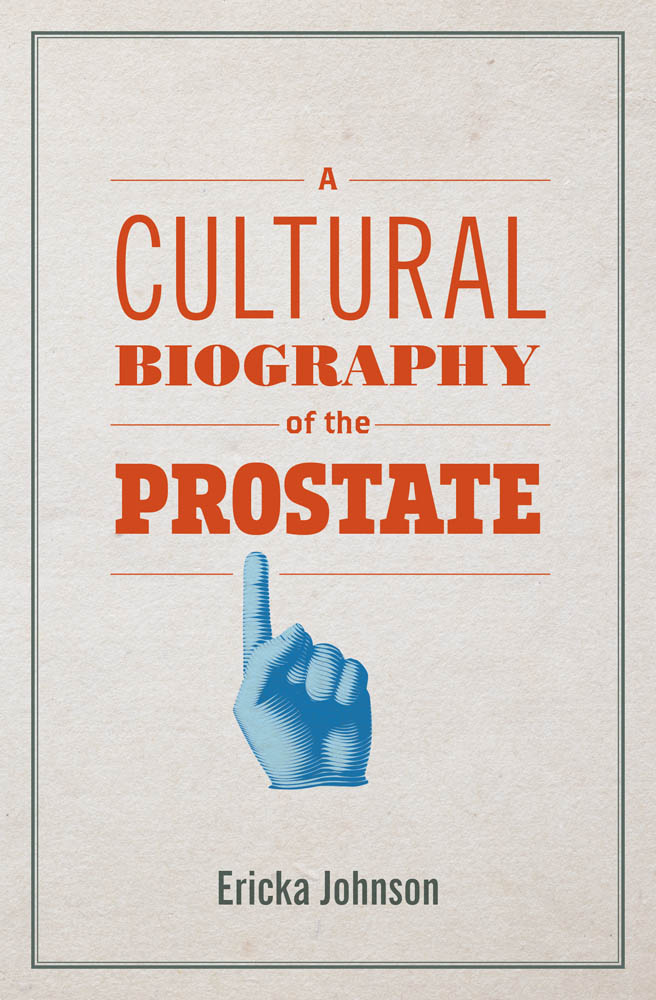
A Cultural Biography of the Prostate
A Cultural Biography of the Prostate
Ericka Johnson
The MIT Press
Cambridge, Massachusetts | London, England
2021 Massachusetts Institute of Technology
All rights reserved. No part of this book may be reproduced in any form by any electronic or mechanical means (including photocopying, recording, or information storage and retrieval) without permission in writing from the publisher.
The MIT Press would like to thank the anonymous peer reviewers who provided comments on drafts of this book. The generous work of academic experts is essential for establishing the authority and quality of our publications. We acknowledge with gratitude the contributions of these otherwise uncredited readers.
Library of Congress Cataloging-in-Publication Data
Names: Johnson, Ericka, 1973- author.
Title: A cultural biography of the prostate / Ericka Johnson, The MIT Press.
Description: Cambridge, Massachusetts : The MIT Press, [2021] | Includes bibliographical references and index.
Identifiers: LCCN 2020050487 | ISBN 9780262543040 (paperback)
Subjects: LCSH: Prostate--Popular works.
Classification: LCC RC899 .J64 2021 | DDC 616.6/5--dc23
LC record available at https://lccn.loc.gov/2020050487
d_r0
To Dad
Contents
The stars we are given. The constellations we make.
Rebecca Solnit
Its the third time since midnight. Your feet slide off the bed. There is a draft on the floor. Cold air tenses the muscles in your shoulders as you shift into a sitting position. You reluctantly leave the warm bed and stand up.
The body next to you grumbles at being disturbed again and turns toward the wall. You walk to the bathroom and stand at the toilet. And stand there. And stand there. And finally, a small stream escapes. A pause. A few more drips. You dont flush, just to spare your partner the extra noise. Crawl back into bed. Try to push the worry about what is wrong out of your head, wolf-hour fears of cancer, expanding middle lobes, and peeing like an old man... about being an old man.... And you try to go back to sleep. Perhaps this has become your nightly routine.
Or, maybe you have gradually realized that you know where the bathroom is at each caf, grocery store, and shopping center in a ten-mile radius. You have noticed that you are stopping at the gas station to take a bathroom break more and more frequently. Long car rides become trying, and events like movies, plays, or concerts are interruptedpossibly even avoidedbecause of the need to pee in the middle of them.
Or, maybe there are changes in your sex life that make you think there might be something wrong. Perhaps you are worried that if something is wrong, treating it is going to radically alter the intimacy you and your partner share.
Whatever the cause, I suspect that if you are reading this book, you are probably worried about the prostate.
You are not alone. Sometimes, I think that we are all worried about the prostate. Men are worried about their own prostates, and probably the prostates of those close to them. Women are worried about the prostates of the men they love, be those husbands or partners, fathers or sons. Even young people are worried about their fathers and grandfathers prostatesand sometimes their own. This is partly because we, as a population, are getting older, and ageing has traditionally been associated with prostate problems. There are more older prostates to worry about. And in the last decade there has been an increased awareness about prostate cancer, a big source of prostate angst. Prostates are the topic of TV shows, podcasts, and pharmaceutical commercials. Newspapers write about them. Doctors ask about them. Everyone is talking about themoften in hushed and serious tones. No wonder we are worried.
And it isnt just the general public that is concerned about the prostate. The medical community is, too. For the last fifteen years, Ive been researching mens health from within medical sociology, and I assure you that the prostate has appeared in a lot of the medical information that I have been studying. These two descriptions and their implicit ambiguity reflect a good deal of the prostate knowledge that I have encountered in my research journey. And it is a perfect example of the undeniably interesting element of medical knowledge about the prostate: it is a gland that haunts. What could be more interesting than a gland that haunts? And what on earth could that description of the prostate be doing in medical diagnostic practice?
A Cultural Biography
That the prostate could be a gland that haunts is, of course, only a metaphor or a trope. The prostate is, still, just a gland located directly under the bladder. And yet it is so much more. Our understandings of the bodyhow we imagine various parts of them, what we think those parts do, what problems they are blamed forare intimately related to the metaphors, tropes, and narratives we tell about them or use to describe or contextualize them. How we and medical professionals describe the prostate, and the words it is embedded in, both reveal and impact on what we think it is, what we think it does, and what we think we should do to or about it. In this book I will discuss what understandings of the prostate are influenced by (and reveal about) tropes of masculinity, sexuality, ageing, and health, both in historical material and in current medical texts and practices. Therefore, I hope it will interest students of urology, medical practitioners, public health officials, and other people concerned about prostate health. But because I present results from an interdisciplinary approach to studying the body that employs ideas and concerns from the medical humanities, I also hope the book will be interesting to those working in that field, in particular medical sociologists and historians of medicine.
I am writing a biography of the prostate. In the same way as biographies use varied and different memories and archival sources to tell the story of a person, I will be using varied and different sources to tell many stories of the prostate. In a traditional biography, it is legitimate to employ a mix of sources like written documents, official information, personal memories, and interviews. Biography as a literary genre can show that different contactsprofessionals, relatives, friends, lovershave different understandings of a person and, in the best of cases, a biography tries to create a rich and detailed narrative about the complexity of a persons life.
This approach can work for objects, too. Even glands. I write about heterogeneous aspects, conflicting understandings, and culturally contextual contours of the prostate, and the way its diverse and multifeatured identity reflects the changing cultural and historical aspects of the bodies it is in. It is not only the prostate that has a biography; the prostate plays a significant role in the biographies of those for whom it is troublesome.
The prostate existsit is a thingbut it is also a scientific object of study, an object that medicine explores and treats. Scientific objects, as Daston points out, have a history. They become entangled in webs of cultural significance, material practices, and theoretical derivations.
Much of the material I have found employs cultural assumptions about hegemonic masculinities, heterosexuality, and typical male behavior in explaining the prostate, and much of my analysis teases out and articulates how culturally specific concepts of male, man, heterosexual, and masculine are engaged and employed in connection with the prostate. This is, of course, not to say that all bodies with a prostate identify with those understandings of male and masculine, or that all bodies with a prostate are cis male. You may have noticed that I used the terms men and women in the narrative at the beginning of this introduction, and I will largely continue with these glosses throughout the book, reflecting the way binary sex is present in the majority (
Next page

